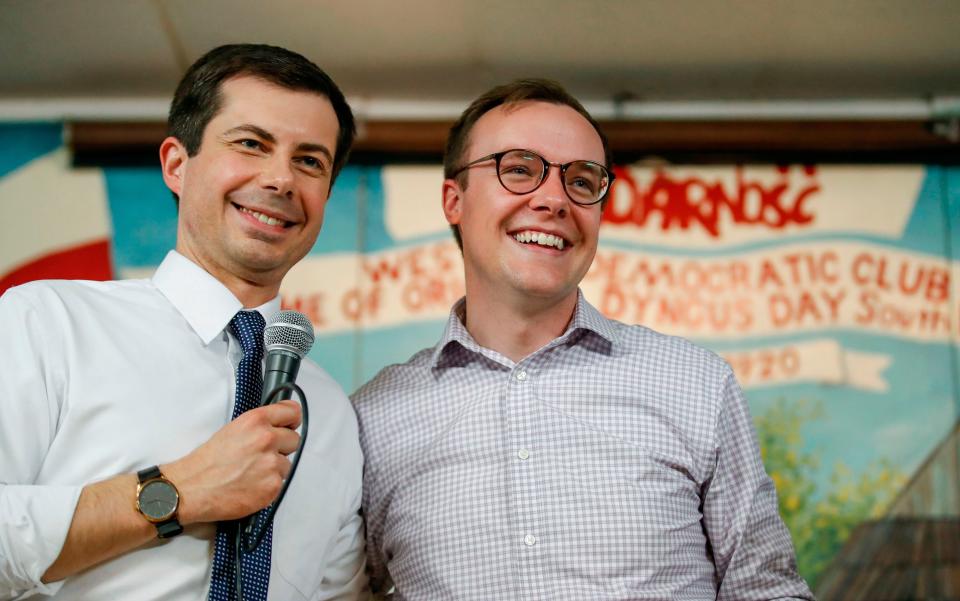America is at a gay rights crossroads, thanks to Pete Buttigieg and the Supreme Court

How far have we traveled when it comes to LGBT rights and acceptance? Two tests are on the horizon. The Supreme Court has agreed to hear three cases that will determine whether federal job discrimination laws extend to sexual orientation and gender identity. And Pete Buttigieg is running for president.
Buttigieg is a millennial, a Harvard grad and Rhodes Scholar who speaks seven languages, a military veteran who served in Afghanistan, an Episcopalian, an alum of the consulting firm McKinsey & Co., and now the two-term mayor of South Bend, Indiana. Oh, and he’s also gay. And married. To a man.
Wait, what? A married gay man running for president, and that’s not disqualifying?
Had anyone suggested this to me six months ago, I’d have said, “No way, no gay.” But that’s before Mayor Pete joined the race. He has been borrowing from the campaign playbook of former President Barack Obama, who never emphasized the historic possibility of becoming our first African-American president. Nor has Buttigieg made his sexuality and marriage central to his campaign. They are simply part of his overall identity.

Read more commentary:
You don't have to be 37 like Pete Buttigieg, but age should matter in the 2020 campaign
Pete Buttigieg is making Republicans nervous
Pete Buttigieg's countercultural approach to Christianity is what America needs now
I watched the 37-year-old mayor make his official announcement. The clean-cut guy in a white button-down shirt and blue tie spoke to a packed house in an old Studebaker auto factory. Not until the midpoint of his speech — after discussing the economy and climate change — did Buttigieg even refer to his husband, Chasten Buttigieg, and the importance of the freedom to marry. He deftly wove the pieces of his narrative together without ever saying the word “gay.”
The mayor's fans had listened to a gay anthem, Barbra Streisand’s “Don’t Rain on My Parade,” during the warmup to the event. At the end, they watched the candidate kiss his husband and walk off hand-in-hand with him. For the first time, at that moment, I believed a gay man could be elected president.
A seismic shift in a short time
Buttigieg is what I’d call “the new gay” — an old-fashioned Midwesterner cut into a decidedly modern mold — with an authenticity that’s scarce in politics these days. In a recent interview in Vanity Fair, Charles Kaiser, acting director of the LGBT Social Science & Public Policy Center at Hunter College, called him “a happily married, monogamous intellectual who … thinks very seriously about all the issues of our time. And realizes that climate change is more important than everything else.” The gay part, Kaiser added, was “almost irrelevant.”
Indeed, the “Rainbow tide” certainly has come in. Lydia Lavelle, the mayor of Carrboro, a North Carolina town next to mine, is a law professor, wife and lesbian. Lori Lightfoot, recently elected as Chicago’s newest mayor, is an African-American lesbian. What’s truly refreshing about Lavelle and Lightfoot — and Buttigieg — is that their sexual orientation isn’t a big deal. It’s simply not about that.
Americans apparently agree. In a new NBC/Wall Street Journal poll, 68% said they'd be “comfortable” or “enthusiastic” about having a gay or lesbian president. (That rose to 75% for voters ages 18-34.) Even among older voters, 56% claimed “no objections" in this same poll. By contrast, in 2006, more than half of Americans said they'd be uncomfortable or have reservations about a gay president. Make no mistake: This is a seismic shift in attitudes in a short time.
The laws need to catch up to the people
But the Supreme Court is also going to weigh in on LGBT acceptance — likely deciding next year whether sexual orientation and gender identity are included under Title VII of the 1964 Civil Rights Act, which bars discrimination in housing, employment and public accommodations. So while Americans could elect a gay man as president, the court could also decide that LGBT people in the workplace are not protected by federal law.
This is all the more reason why the proposed Equality Act is a necessary protection for LGBT people in areas ranging from employment, housing, credit and education to public spaces and services, federally funded programs and jury service.
Buttigieg’s electrifying rise certainly doesn’t signal the downfall of anti-LGBT bias or violence, just as Obama’s election didn’t end racism. Far from it, especially as hate crimes against queers continue to mount and the Supreme Court considers whether equal protection under the law applies or does not apply to LGBT people.
Mayor Pete’s candidacy, however, most certainly signals the rise of millennials and their pressing concerns. If he ends up getting the job he wants, it won’t be because he’s gay. It will be because his focus on climate change is more important than his sexuality. Let’s hope the Supreme Court concurs.
Steven Petrow, a writer on civility and manners and a member of USA TODAY's Board of Contributors, is the author of five etiquette books and host of The Civilist Podcast. Follow him on Twitter: @StevenPetrow. Kenrick Cai contributed reporting to this column.
You can read diverse opinions from our Board of Contributors and other writers on the Opinion front page, on Twitter @usatodayopinion and in our daily Opinion newsletter. To respond to a column, submit a comment to letters@usatoday.com.
This article originally appeared on USA TODAY: America is at a gay rights crossroads, thanks to Pete Buttigieg and the Supreme Court

